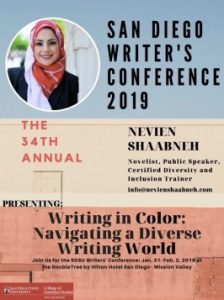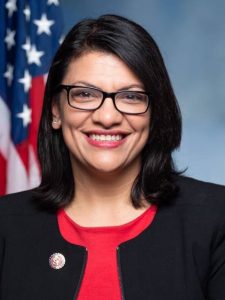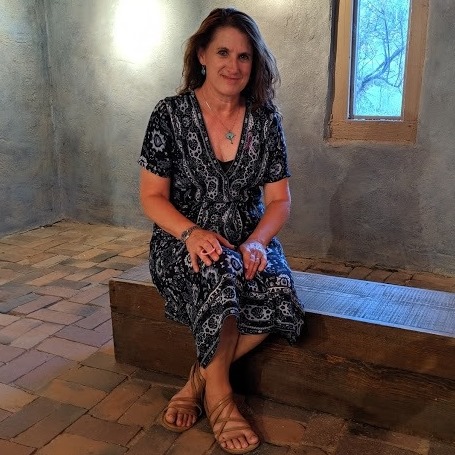 It is no secret that we are living in challenging and often troubling times. But as some factions struggle to hold on to archaic ideals and longstanding hatreds, the larger world is increasingly leaning into the reality that cultural and intellectual diversity is a strength. Through her her writing and speaking events, Chicago-based author and diversity training specialist Nevien Shaabneh has become a powerful voice for inclusion that helps everyone from corporate America to aspiring authors transcend culture, race and socio-economic demographics.
It is no secret that we are living in challenging and often troubling times. But as some factions struggle to hold on to archaic ideals and longstanding hatreds, the larger world is increasingly leaning into the reality that cultural and intellectual diversity is a strength. Through her her writing and speaking events, Chicago-based author and diversity training specialist Nevien Shaabneh has become a powerful voice for inclusion that helps everyone from corporate America to aspiring authors transcend culture, race and socio-economic demographics.
Open Mic: Secrets Under the Olive Tree is really a lovely book. What was the inspiration for this story?
Shaabneh: Thank you for the kind words. “Secrets Under the Olive Tree” started out as a short story. I was envisioning this little girl sitting under a kitchen table while her mom and neighbors would sit around and make this very traditional and time-consuming Palestinian dish where they rolled grapefruit leaves. I envisioned this little girl just sitting under this table and listening to the different stories that her mom and her friends would share, and from that story the entire novel was born. I expanded on the different lives of the women and this little girl, envisioning her growing up. It ended up evolving into this story about the main character, Layla Anwar, an Arab girl born in Palestine who moves to the US. From there she is contending with being an immigrant and how her family dynamic changes as they adapt and acclimate. It’s a coming of age story about the process of healing, of living in one’s truth and her reconciling and healing from childhood trauma.
Open Mic: You are also working on a new book. Tell me a little bit about it.
Shaabneh: “And the Stars are Fire” is a novel that spans three generations, narrated from the perspectives of three Middle Eastern women. It is in present day New York, but the story spans back from 1950’s Jerusalem. One of the characters believes that the sins of her past have cursed her family, and so throughout the story she is setting out to undo this curse. Her granddaughter on the other hand believes that someone is seeking vengeance on the family, so we have the granddaughter and the grandmother who are at odds with what’s happening to their family. After the granddaughter loses her mother and her sister and the grandmother goes missing, the main character returns to Jerusalem and investigates her grandma’s theory of the family being cursed.
 Open Mic: Are either of these two books autobiographical? I ask that knowing that all writers of fiction incorporate some elements of themselves into their books, but that does not automatically make them autobiographical.
Open Mic: Are either of these two books autobiographical? I ask that knowing that all writers of fiction incorporate some elements of themselves into their books, but that does not automatically make them autobiographical.
Shaabneh: I think you put it well. I think that all writers pull from their lives, and for me I wanted to have Palestinian characters and Arab characters. I’m Arab, and my family emigrated to the U.S. and in “Secrets Under the Olive Tree” my main character’s family immigrated as well. So those aspects are pulled a little bit from my life, but the story itself and how she grew up and the trauma that she dealt with was more as someone who is empathetic with the stories I have heard from different women. I used to lead a women’s group once a week, and I pulled from a lot of my experiences with people and some of the different issues that I’ve heard about in the various works that I’ve done. So in that sense the story is realistic fiction. Secrets Under the Olive Tree contains domestic violence and alcoholism, aspects that have happened in so many people’s lives and which transcend culture, religion, race and socio-economic demographics. I know that my readers don’t have to be Arab or Palestinian or Muslim to empathize or sympathize with the story because so many of these issues impact so many people’s lives.
Open Mic: We’re in such contentious times, with so much hatred and intolerance seemingly being woven into the fabric of our daily lives through politics and social media and even through the mainstream media. Much of that is aimed directly at Muslims. As a Muslim woman, how does this environment impact you and your writing?
Shaabneh: I think this impacts a lot of marginalized writers, not just me. One of the things I talk a lot about in my diversity inclusion work is that most of my book talks become diversity, inclusion, and equity talks. Even when I am invited to give a book talk, the conversation will eventually become about the audience understanding me as a Muslim woman and understanding why these narratives are important. In that way it did affect me as a writer because I don’t know one single time that I was ever invited to give a book talk where it didn’t eventually center on diversity. I’m not surprised, and I always feel honored that I was even able to have these opportunities because this mic is not given to all people or all Muslim women. Rarely are Muslim women invited to the table to discuss issues that impact them.
Of course, novels need conflict. We can’t write about perfect, happy, pristine families. Books need conflict, so if I write characters that are flawed or that are villains or a character that is a Muslim man who is a bad person because I need to write this villainous character, the danger in that is that somebody reads it and goes “look at that, Muslim men are dangerous, they are bad to their wives.” I talk about this with other writers. If we’re writing these characters and they’re flawed, are we then representing our people as flawed? It’s a really difficult place to be in because you still want to write authentic stories and you still want to write about issues that impact your community, but there are already so many stories out there not told by us or not represented by us that are negative.
Open Mic: I completely understand what you’re saying. It seems like the people of a culture have to absorb all of the flaws of that character as representative of their culture, and yet that is not the case for the rugged, good looking Caucasian cop, secret agent, cowboy, or whatever. All of their flaws are just their flaws, but the flaws of a character of color in particular become the flaws of the entire culture.
Shaabneh: In “Secrets Under the Olive Tree” the father is an abusive alcoholic. He’s not the only Muslim/Arab character in the novel, and there are other characters who are good representatives of men in general. So on one side I have Muslim people who say “Why did you write him as a bad person? Muslim men are already villainized and demonized in our society.” On the other side I have people who are not Arab or Muslim say “Oh wow, this was my experience with my father,” or “I never thought I could relate to a character or a family so unlike me.” But these experiences transcend culture, race and socio-economic demographic. They transcend everything. We need to stop looking at them as part of categories that belong to certain people and looking at them instead as human experiences.
 Me: For anyone who may not know, tell me what a diversity inclusion and equity specialist is and how you acquired that title or certification and then describe what one of your seminars offers to people.
Me: For anyone who may not know, tell me what a diversity inclusion and equity specialist is and how you acquired that title or certification and then describe what one of your seminars offers to people.
Shaabneh: I’m certified to conduct diversity, inclusion and equity training seminars, which allows me to conduct these events for larger organizations. I was propelled into this field through my writing and through the public speaking that I did in some capacity for the last 15 years or so. It was just natural for me to get certified because this is what I was already doing. Whether it’s for a university or a business, or if I’m invited to a writer’s conference or a literary agency or a publishing company, I first take a really close look at the needs and the goals of the organization and what they hope to accomplish. Sometimes the goal is employee to employee or employee/employer interactions, and sometimes it’s far more focused on clients. With literary agencies or writers’ conferences it’s about representation in books. It’s more about me providing background on what diversity inclusion and equity means to that specific organization, and how it’s important to them. I like to cover some historical aspects and even delve into the science about how our brains work, and then I go into what we can do to be more mindful and how we can apply this to our lives to help us create better relationship or a better work environment, and to become better writers. I never tell people what they should think or what they should do. I provide the information. I provide different perspectives. I provide some of the science, some of the laws that center around the terminology and how it has changed, but I never go in telling people this is what you should be thinking or doing, or this is wrong or this is right.
Open Mic: What has been the reception in general from your audiences? Do you ever run into resistance?
Shaabneh: I use a lot of humor and storytelling when I start the presentation, and then I intersperse that with the research and the science. I’ve been told – and this is really something I’m quite proud of – that the environment that’s created from the first 10 minutes of the presentation is that you can ask any question, that we’re all in this together and there is no finger- pointing. It’s not about feeling bad about something or feeling guilty or this idea of “I know this already, why are you telling me this?” I’ve had people ask tough questions and then afterward had someone come up to me and say, “wow I can’t believe you answered that question so calmly.” But I’m happy they asked the question! My focus is always that it is okay to ask the tough questions. Let’s talk about this and lay all this on the table. I’ve had people come up to me afterward and say “I know that was a hard question but I really appreciated your response,” or come up after presentations and hug me, or cry. In some ways it becomes cathartic and healing.
Open Mic: How did you come to choose storytelling as a way of reaching people in your audience?
Shaabneh: We are all inherently storytellers. This is how we passed on history and language. I am fortunate because as a writer it comes naturally to me. I also come from a culture where storytelling is important. I grew up around my mother and my grandmother, the people around me telling stories. Every lesson I ever learned had a story. If I asked if I could go here or can I do this, rarely was there a yes or no. It was just “sit down, let me tell you a story of about this girl.” So I learned all of these important aspects of my life through stories. I think scientific research or statistics can be easily forgettable, but when you tie it with an important story that really fits what you’re trying to say, then we’re really bringing heart into whatever those numbers are. After a presentation, we might not see each other again, but the audience members will usually remember the stories that I told.
Open Mic: How do you see the publishing industry now in terms of the opportunity and equality for diverse voices and diverse stories?
Shaabneh: I think we’ve made great strides. I think that there’s definitely more initiative to promote diverse voices and diverse stories, and we’re at the point now where it’s a good time to start looking at the nuances of those voices. For example, can a woman of color write a book that has nothing to do with an expected experience? Does that make sense? Can it just be a really good story? I don’t feel like my stories center around just being Palestinian and Arab, but I also don’t think that’s the biggest part of my story at all. So I’m curious to see books that are published by people of color where the stories are open and not limited to a specific experience.
Open Mic: Do you start more with plot or with characters?
Shaabnah: I have the idea for the character and the central conflict I want to talk about and then I plot around that. And then I just start writing.
Open Mic: What’s the best advice on writing that you’ve received? Conversely, what’s the worst?
Shaabnah: The best advice I have received is to carve out time. Establish a routine, have a goal or a word count that you want to hit every week or every day and really honor the time you have carved out for writing. Then move on with the rest of your life so that it doesn’t become this obsessive thing. I think writers can be quite obsessive about their work and feel guilty that they didn’t write. Writers can go into a cycle of self-doubt. So, take your time, do your part and then move on and do other things that you have to do in your life.
The worst advice I received was when I first started writing was not to do it. Some people told me that I was just making my life harder, that it would not be worth it. People around me thought they were being practical by dissuading me from pursuing writing because it’s not one of those things that is guaranteed. And I did put off the novel. I shelved it and didn’t look at it for a couple of years. When I did pursue it again, I didn’t tell those people so I didn’t get those negative vibes. I think that was the worst advice.
Open Mic: And what advice would you give to others?
Shaabneh: Keep going! Keep learning because there’s a whole other level to writing as a business. Follow writers that you admire, read about their process, read the kind of books that you want to write. Read, read, read as many as you can and then figure out early on what genre you are striving for. Learn as much as you can about that genre and then just figure out a time to write, take it day by day and just keep going.
 Open Mic: I like to end on what I hope is a fun question. If I had the power to put you together for dinner and a conversation with just one of the following three people, who would you choose and why? Your options are: The renowned British baking maven Mary Berry, U.S. Rep. Rashida Harbi Tlaib of Michigan, or Chicago icon Bill Murray.
Open Mic: I like to end on what I hope is a fun question. If I had the power to put you together for dinner and a conversation with just one of the following three people, who would you choose and why? Your options are: The renowned British baking maven Mary Berry, U.S. Rep. Rashida Harbi Tlaib of Michigan, or Chicago icon Bill Murray.
Shaabneh: That is so hard because I love baking, my father loves Bill Murray and I definitely would love to sit with Rashida Tlaib just to talk about her experiences as first Palestinian Arab woman congresswomen. I would say ideally all three, but I would love to sit down with Representative Tlaib and talk about her work and her experiences and just to hang out with her.



